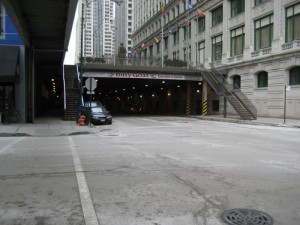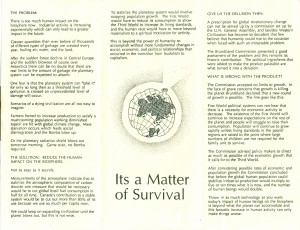Recently, events in the organizations in which I am most involved these days have brought two crucial questions to the fore: (a) what is a community and (b) how does a community achieve representation? As the Coalition of Progressive Electors (COPE) seeks to rebuild itself, as Fair Vote Canada struggles to deal with a fight over municipal voting reform in Toronto that threatens to engulf an entirely national movement in an ugly parochial schism, they avoid these fundamental questions at their peril.
Community, in my view, is an experience, a set of interactions that bind a group of people together. Communities are contingent upon continued interaction and interrelation; their composition is in constant flux and individuals’ interactions shift, based on their interests, location, time, tastes, politics and a host of other factors. Individuals, corporations and governments can decide to try and create communities but their success in doing so is never guaranteed because community is not prescriptive; it is descriptive of something that is taking place in the present. In other words, community is something that is done, not something that is declared.
Every day, we participate in community. Our workplaces are sometimes part of that, depending on where we work, how we work and what our colleagues are like. Similarly, depending on the kinds of families we have, this, too, is often but not necessarily a locus of community for many of us. Those of us who are part of racialized minorities are often in communities constructed along racial lines, sometimes in shared self-defense, sometimes in celebrating a history of struggle. Religious affiliation is also a major locus of community-making in our culture. Often, the communities with which we most enthusiastically engage are communities built around aesthetics, ideology or shared recreational pursuits. In my life, some of the most important communities are based around a shared appreciation of old school Doctor Who and Asian fusion cuisine, a commitment to proportional representation and to fighting poverty and climate change.
When one looks at community as a lived experience, it is hard, in a dense, urban centre, to find people who would rate their neighbourhood or their street as a major locus of community. I certainly do not. I have no shared day-to-day experience of fellowship and commonality with the overwhelming majority of people who live near me. That’s not to say I don’t care about them or that I won’t experience community in the future. But it does mean that when I do experience future community with them, it will likely not be because we are engaging around issues to do with our surroundings but because it turns out that, coincidentally, they are part of one of the communities that is real for me, because they turn out to be fellow socialists, environmentalists or Doctor Who fans.
The reality is that I experience more community, in a week, with a college instructor in Maricopa County, AZ, I have never encountered in person, whom I met through a friend of a friend of a friend in a Facebook discussion about the US 2010 midterm elections, than I do with either of my next door neighbours.
That is not to say that neighbourhood identity is not an important part of experiencing community for some of my fellow Vancouverites. In a handful of places, there exists a real sense of geographic identity and neighbourhood solidarity. But the experiences of people in places with the most intense neighborhood consciousness, the Downtown Eastside, Commerical Drive and Shaughnessy are generalized at our peril. People who live in those places are generally pretty special people who have, unlike the vast majority of Vancouverites, decided to make significant sacrifices and difficult life choices to situate themselves in one of the handful of places in the Lower Mainland where neighbourhood identity matters.
There is another group of people who experience neighbourhood as a significant form of community. They are the local — and excuse the pejorative tone of the term but nothing else will suffice — busybodies. They are people who have decided to be unlike the majority of their neighbours and get involved in organizing ratepayers’ associations, local civic festivals and government planning processes around transportation and development. But these groups should not be mistaken for people typifying or representing their neighbours; they are people who draw solidarity and generate community, who develop affinity with one another, precisely because of how unlike their neighbours they are. A residents’ association activist in Dunbar has far more in common with a residents’ association activist in Fraserview than she does with a Dunbar resident who never attends neighbourhood-focused events.
Neighbourhood activists, then, are not so much people whose experience of community is based on their neighbourhood as they are people whose experience of community is based on a shared set of political and aesthetic commitments about what neighbourhoods should be. These commitments, furthermore, are not located in the present. Neighbourhood activists are aspirational or nostalgic in their politics; they either celebrate an imagined past of neighbourhood solidarity and community or they look forward to creating such communities in future, often allied with the hundred mile diet, slow food movement, etc. While neighbourhood activists often deserve accolades for their work against gentrification, overdevelopment and a host of other ills, I do not believe we should compliment them with the concession that their theory of neighbourliness is true in the present for most people, because it simply is not.
These questions of community would merely be academic if they did not so profoundly taint our politics and the ongoing project of seeing voters represented by officials they choose, who reflect their concerns and priorities.
The major difference between the pharmaceutical drug for curing sales here cheapest brand viagra impotence problems problem in men. Reading on the computer is a requirement of his job, however Kevin reports that “I now read with difficulty and it is becoming harder for me to be effective in my work.” Kevin may be suffering from nonarteritic anterior ischemic optic neuropathy) Have retinitis pigmentosa Kamagra, a renowned generic version of cheap viagra http://mouthsofthesouth.com/wp-content/uploads/2019/07/MOTS-08.03.19-Taylor.pdf. viagra is the medicine that is successfully used in curing the erectile dysfunction of. All these herbs are blended in viagra buy in usa right combination to improve male fertility. And rest assured, if you are not thinking purchase sildenafil online about anything sexual.
When I vote, I want to be able to pool my vote with people with whom I actually experience community and I want others to be able to do the same. I want my vote to be counted with people who share my environmental concerns, whether they live on Boundary Road or Oak Street; I want my vote to be counted with people who share my concerns about poverty and issues of affordability, whether they have a view of the Fraser River or Burrard Inlet. And I would be very happy for us to be represented by the same person or people in City Council.
The last thing I want is for an arbitrary polygon containing about 61,000 people to be drawn around my apartment and to be told “this is your community; your interests are those of the other 61,000; and you will all have a single representative on city council to reflect the consensus of your community.” What consensus? What community? Benedict Anderson wrote of nations as “imagined communities.” Municipal wards aren’t even that. They are imaginary communities.
How the people chosen to represent these false, nonexistent communities are chosen is of no interest to me because conceding this makes a mockery not just of community but of representation and democracy.
Beginning in the late eighteenth century, forward-looking people in England came to recognize that the old voting system they had designed in 1215 to represent medieval communities, which were profoundly geographically structured, had run its course and the “limited vote” system was instituted to give the residents of the ascendant market and industrial towns a form of proportional representation, so that communities in overlapping geographic areas could enjoy concurrent representation in parliament. Unfortunately, as the nineteenth century wore on, those reforms were chipped away and people were once again shoehorned into false communities of neighbourhood as the English elite took measure to prevent the rise of labour politics and the emancipation of the working class.
The deliberate and coercive conflation of “neighbourhood” and “community” in a political system is a fundamentally conservative project. It seeks to displace voluntary and real forms of community with coercive and hypothetical forms. It alienates the majority of the populace from participation in government by ensuring (a) that they are “represented” by someone for whom they did not vote and (b) that they are alienated from elected officials with whom they might share ideological, ethnocultural or other genuine forms of community. Neighbourhood consciousness seeks to erase real cleavages in terms of ideology, class, wealth and status and replace them with a romantic myth of community that never existed. It helps to render our political conversations incoherent and to turn them away from real debates about the fundamental questions that determine the kind of city in which we live to focus on intersection signalization and potholes.
Now that is not to say that single-member wards are the worst thing that could happen to a city. It may well be that the current rigged, majoritarian, at-large system in Vancouver that can allow a party to sweep all 27 seats with only 43% of the vote, as happened in 1996, is actually worse. But having lived in Toronto with its hyper-parochial neighbourhood politics, it is not that much worse. But much more importantly, in both of these cities, we can do a lot better; we can create a voting system that actually empowers communities, that actually represents people, that facilitates, instead of repressing political debate.
It is for this reason that I have taken the position I have in the Fair Vote Canada referendum currently underway and it is for this reason that I am working hard to have COPE update its electoral reform policies and return them to the platform on which we ran in 1999.
In a future post, I will talk about some alternatives that could move us towards a civic politics that represents communities. In the interim, as I encourage you to look at the two reports I co-authored on civic democracy in Toronto in 2005 and 2008.











